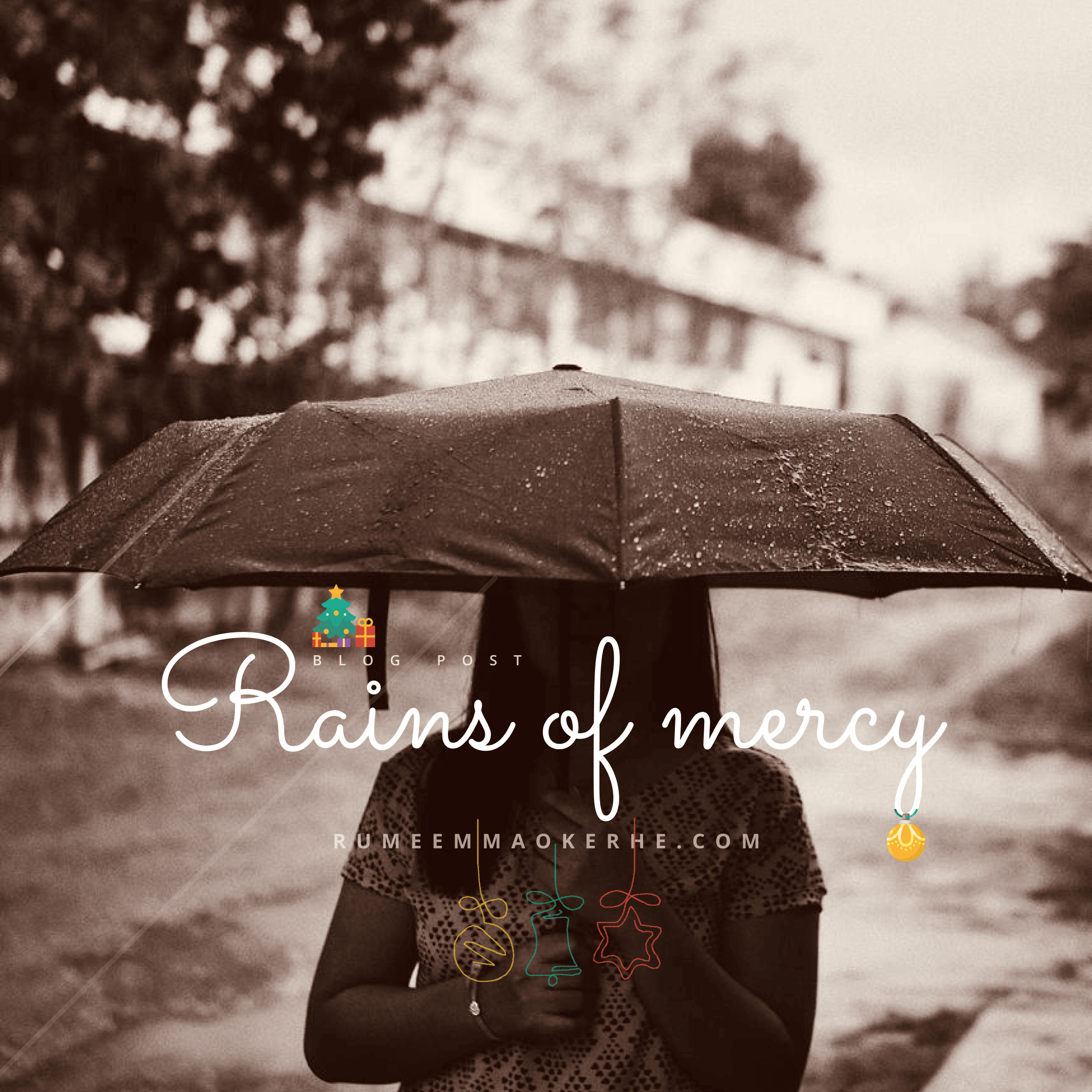
Rains of Mercy
Total Reading Time: 15 minutes Having parents serving in ministry meant being part of kingdom work oneself. As such, Tehillah

Canterbury, 1824
Fanny would slit her throat with a blade. Crouched on a bench, by the cottage, she turned the huswife everyway, contemplating her decision just one last time. No one would miss her, not even Mother. She scowled, remembering Mother’s face wrinkled from both age and rancor. Her bitter voice always echoed Fanny’s shortcomings, her ills as though they were her fault. Since Father died, Fanny had stopped to receive Mother’s love and even when she complained of the coyness of Mr. McKinney’s tone when he addressed her, she had dismissed her, saying she should be grateful she had a job in such elite home:
“Not everyone gets the chance to work in the home of a member of parliament. Should you be good to them, we might receive for favours and privileges of social connections.” When Fanny started to whimper, throwing her hand over her face, Mother asked why she would not allow things be. “We already as poor as we could be. Unfortunately, we also have outstanding debts from your father. Please Fanny, do not make things worse.”
“But I hate the way he looks at me.” Fanny recalled his dancing eyes and slithering voice. He addressed everyone with an air of familiarity which though others did not seem to repel, made her skin creep.
“I’m sure Mr. McKinney means no ill. It’s all in your head.”
Fanny refused to listen and shivered with convulsive sobs. How was she to work in comfort when her mind jostled every time he called her to his study? She scampered to her room when Mother started to say something about her wishing that Fanny met a man who could take care of them.
“Should you meet a vicar or a deacon, my heart shall rejoice, and all the pain will be gone.” Laying on her mattress, Fanny had mourned the loss of her father and the unfortunateness of her life. How Mother weighed life on a scale of social connections and financial security, since Father died, was appalling.
Digging her gloved hands into her coat, Fanny clutched tight at her gown. She shivered more from hurt than the cold of winter. She was a misfit; not even Mother wanted her. She acted as though the burdens of their lives had been multiplied with her presence. Not once had she stopped to whine about the mutton and cheese they never had, the hardness of England, the uncertainty of tomorrow. Her elder brothers, Willoughby, Gordons and Peter all apprenticed in London, leaving only her with Mother in Canterbury.
“With time you’ll get used to her.” Willoughby had ruffled her caramel hair, playing, two Christmases ago when he came visiting. She had whined of how she tended for the nursery of daisies by the picket fence of her home, mopped the rooms and washed the dishes yet Mother would never allow her have a cup of milk.
“Used to her? I shall never be able to adapt to such callousness.” She was going to say more when Willoughby stopped her. She shrugged, brushing her hair into place and wearing a bonnet over it.
“You should not speak of Mother in such manner. She is hurting as you are.” The tenderness in his eyes said he understood how she felt. He placed a cordial hand over her shoulder and squeezed it. “You will be fine.”
She had thought the same until Mr. McKinney did the dreaded. How was she to live knowing she had been violated? The hurt stung and the shame ridiculed her. For fear that Mother would mourn the loss of her chances for good marriage, rather than her welfare, she decided to tend herself. She stood, opened the lid of the huswife and picked the blade. Had she more presence of mind, she would have drowned herself in the River Stour. But to serve a lesson to Mother, she had written a letter to her including the particulars of her act:
Dear Mother,
I shall not ask of your wellbeing or wish that you remain well after reading this. The hurt you sow is such that you will reap. I am taking my own life, behind the cottage. I bear no memory of your telling me that you love me or appreciating my efforts. Since Father passed, I recall no occasion of your showing me love. So, I leave to a better place, free of yells and grunts.
I will always love my brothers. Tell them.
Fanny.
Mr. McKinney’s act, one week ago, came to mind. She snapped her eyes, remembering his grip on her waist, the twist of her head, the shove onto the floor of his study. She shook her head in pain and lifted the blade to her throat. She stopped the train of thoughts and tore an inch of her skin. Blood trickled. She winced at the pain but shut her eyes tight. This would be the end. This had to be the end.
Seated on a stool, Mother knitted through the last line of Maxwell’s coat, her mistress’ four-year-old. The cardigan stood in an array of intricate tapestry, with fine gold threads hemming the edges. This was the reason Mrs. Jackson loved Mother and sometime paid some pence extra; she was dexterous and creative. Mother stood and handed the coat to Mrs. Jackson who exclaimed with joy. “Thank you! Its’s more beautiful than I imagined it would be.”
Mother left Mrs. Jackson’s home at Chesterfield and trudged towards Canterbury where she lived. The long, exhausting journey caused her to reflect on the difficulties of her life. Since losing her husband to consumption five years ago, she had had to shoulder the responsibilities of her home alone. Thus, she quilted for as many as possible and had made sure Fanny earned some money herself. “Oh, Fanny,” She muttered in exhaustion. She adjusted her bonnet to shield the setting sun from her face. Carriages trundled past her, beadles stood at turns and stations. Chesterfield rustled with the business of Christmastime. The cobblestone roads were covered withs carpets of snow, and by stores, baubles, balloons and ribbons hung. Taking the path along the Stour River, she remembered Fanny again. She knew her daughter despised her for her firmness, but was certain that with time, she would appreciate it. “All I do is for your good.” She pulled her scarf over her neck. Had she been able to comfort herself of the loss, she would have reached out to her seventeen-year-old. But she had not, so she left their healing to time. She hoped that years to come, they would find the love they once shared as mother and daughter. Recalling the joy that echoed in her home years ago, before her husband passed, her eyes burnt with tears. How she wished someone could heal her aching heart. Mrs. Howard, a neighbour had invited her to Church, saying she would feel better if she met Jesus, but she had refused. How would Jesus or going to a gathering give her what she longed for?
She reached her cottage and unbolted the gate. She knocked, reaching the porch. “Fanny, I’m home.”
No response.
She dropped her bag and circumvented the house. She reached the yard and froze from fright. In a pool of blood, Fanny laid, face ashen.
Fanny awoke with a sharp pain over neck. Swallowing proved painful same as every turn of her head. She sat, drinking with grave difficulty, a cup a juice when she saw Mother approach her bed. She looked away; she was grateful she was alive but hurt to still be with Mother. “I do not want to speak to you.” She shuddered when Mother’s hand brushed her cheek.
“Please Fanny, look at me. I read the letter. I am sorry I have been inconsiderate. We are both grieving. I could not help myself, I ignored your need for help too.” Mother sobbed when Fanny would not budge. “Oh dear, please pardon my ills. I have in no way, intended them as you perceive.”
Fanny turned her head towards the ceiling and told her what she had refused to hear all the while. “Mr. McKinney violated me.” A torrent of tears followed. Her brows furrowed and dark layers circled her eyes. Her shoulders sunk and her limbs were limp as a sick sheep’s. “I know you consider me useless now. I shall never be able find a good man to marry―”
Mother hushed her. “Don’t say that, Fanny. You hurt me.”
They said nothing more, allowing silence alone to be their dialogue.
Minutes passed and Mother asked if Fanny would like to go to Church. “We both need help. Let’s see if Jesus as Mrs. Howard says, would be any.”
Three days after, they were seated within the St. Peter’s Chapel watching plays about the pregnant Mary and baby, Jesus. Tons of laughter ensued when the toddler who acted as Jesus, saw his father within the congregation and had waved, calling out to him. At the end, the reverend led a doxology which they all sang, reading from parchments. “Amazing Grace. I was once blind but now, I see. . .” He explained how the writer of the song had lost all in a shipwreck but had never lost hope. “We may be cast down, trodden on all sides, but God makes us more than conquerors.” Hallelujahs echoed in the building. “That’s a victory we have in Jesus! That’s the hope Christmastime brings.”
The reverend made a call and Fanny and Mother, like several others poured to the altar. She did not how it was going to happen, but Fanny ached for joy and love. “If you can do it, Jesus, then please do.” She repeated what the Reverend said, ready for a new way of living. For the first time in years, she hugged Mother long and tight, that cold, winter night, knowing it would forever be a Christmas to remember. Something told her so. Everything told her so.

Total Reading Time: 15 minutes Having parents serving in ministry meant being part of kingdom work oneself. As such, Tehillah

Total Reading Time: 15 minutes Listen to audio version Frustration burned within Lisa, fervent as the crackling coals at the